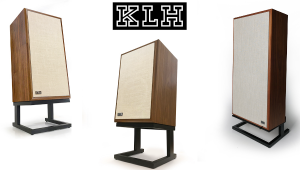Another informative (but too short) interview by MM. I always enjoy hearing from Ian Anderson, which is part of my reason for buying all the Jethro Tull surround editions. Thanks for the heads up on Broadsword and the Beast. I purchased the high res (48/24) download of The Zealot Gene (highly recommended) before realizing there was a BD with a surround mix. Now I'll have to get that!
Anderson is spot on saying it's a waste of file space to go above 48 kHz. Even 24 kHz/ear is beyond human hearing and is at the limit of what many (including mine) speakers can reproduce. What surprised me was his comment that there isn't much benefit going above 24-bits. Having never heard a 32-bit audio file I'm not qualified to voice an opinion, but it's disappointing if true since I've been hoping to hear some 32-bit music.
Ian Anderson on the Zealous Nature of Jethro Tull's Past, Present, and Future Page 2
Anderson: I guess it was Mike, yes. I didn't know him at the time, but he said, "Oh, we've got a recording studio here as well." I said, "Oh, that's interesting. You know, I'm in that game too. Where is it?" And he said, "Well, it's actually in the garage. The garage doors are fake. You can't open them. You go in from the house. It's more of a control room, really, rather than a big place you could record live drums in." To avoid issues with the planning authorities, he'd just hidden it and buried it in the wells of his house, disguised as the garage.
And then he said, "Do you want to hear something?" I said, "Yeah, sure!" So, he played me [The Moody Blues' seminal, symphonic prog 1967 hit] "Nights in White Satin" in quadraphonic sound and I thought, "Wow! You know, that's good!" And that sent me on the trail of doing quad.
I ended up going to Japan to work with the JVC engineers on what was then the encoding of the rear two channels as a digital format — but it was still being pressed on vinyl, and you really couldn't get a great sound out of the back. It was very lo-fi, a very limited bandwidth, and prone to inner-groove distortion as you went through the record's side.
It was never going to be a biggie — but I did go back and tell [label co-founders] Terry Ellis and Chris Wright at Chrysalis Records, "Look, being able to encode this stuff as digital information — they're also working on the picture disc with a sort of laser pickup." And then I said, "Imagine — forget laserdisc [which debuted in late 1978], forget quadraphonic sound. You could put all this information onto a disc this big [Anderson makes a circle the size of a CD with his hands], full stereo digital things. It's not been invented yet, but that surely is what people should be working towards, and so maybe you guys want to be, as a record company, getting in there to look at the possibility of a small disc that would be digital-only audio."
I mean, that was back in the latter part of the '70s, in like '78 or something. It really was a few years before the CD suddenly appeared on our shelves [in late 1982], or the DVD [in late 1996], but that indeed was their outcome, not surprisingly. Well, not surprisingly to me, (MM laughs) but I'm sure the guys at Sony and JVC and the other Japanese companies were already thinking ahead about the prospect of new formats for audio. Back then, 16 bits seemed like an awful lot of bits, compared to what was there before. These days, we realize the limitations of 16-bit.
Mettler: Yeah, and you prefer 24-bit just like I do, right? As an artist, don't you prefer 24-bit over 16-bit, in terms of how you record?
Anderson: I record in 24-bit, but I record at 48k [i.e., kHz]. Lots of people who feel the same way as me may have gone to 96k — well, ok. But, frankly, to have to have double the size of files taking up twice as much space on your hard disk and computers — that's wrestling with such a large file for no benefit I can see. With 48k, you've still got the full range of the human ear, divided in two because of the two halves of a stereo signal. But it's still better than our ears, and I think the bit rate is the really important thing.
But after all this time — and it isis now a long time, practically speaking — I don't know of anybody who works in anything other than 24-bit. Beyond that, we don't really get any benefit. It's like modern cameras and lenses. If you've got a 40-megapixel sensor, then it doesn't really seem — our eyes are not going to be able to determine any difference.
The human physiology does not really justify going, over and over, to bigger file sizes, just for the sake of pretending you've got more fidelity, or better visual content. I feel that way about audio. I think we reached the theoretical best option quite a few years ago.

Mettler: Some artists say they can tell the difference at 192. At a certain point, I wonder if you could just say you heard something different at, why don't we just decide we'll call it 326 — but would it really be any different?
Anderson: I'm afraid my attitude to somebody who says they can tell the difference is, well — he's a phony, frankly. He's a phony, He's not telling the truth. You can convince yourself one audio file sounds better than another, but then you have to go back and listen again. I mean, you'd have to do a blind test with several examples of different source material for those two. If somebody got it right 52 percent of the time, you might give a little bit of credibility — but the chances are, if they get it right, you're just going to say, "Well, that's just within the realms of statistical probability you're going to get it right roughly half the time." And, frankly, I think people are just kidding themselves.
But people who don't really do things for a living and spend their time meddling, as opposed to performing artists who get on to play the bloody thing instead of fretting about the merits or otherwise of one system versus another — I mean, you're kidding yourself. It's all about the source material, really. There are so many other things to take into account before you start worrying about audio fidelity or that extreme level of being in fantasy land, I'm afraid. I think someone's bulls----ing if they tell you that.

Mettler: I agree a lot of it comes down to the quality of the performance, and the source material itself. And if we're not getting the performance on a Zealot Gene song like "Mine Is the Mountain," which has a very clear sense of character to it, then it's not worth it at all. To me, each song on this record seems to have its own character, even though you sort of have a theme tying them all together. Was that your M.O. — that you wanted each song to stand on its own, even if you were being thematic overall?
Anderson: Well, the songs are written and arranged in that way — to be standalone songs. I sat down to write a collection of songs which were based on different, human, strong emotions. I wrote a list of good stuff, like compassion and love. Platonic love, erotic love, spiritual love. Loyalty. The good emotions we're capable of as a species.
I also wrote down a bunch of the bad things, like anger, greed, jealousy, and retribution — vengeance, you know. I looked at my list of words, thinking about how each word would apply to a different song. And then I thought, "Well, I've seen all these words. They remind me of the words I remember reading in the Bible." So I did a Bible search of lots of those examples and copied and pasted some text, which I put in a document as a reference when I came to write the lyrics for the songs.
But I wasn't illustrating the Bible, as such. I was using some of those descriptions as a starting point. When I read the Bible verses, I got a picture in my head. And then I turned that picture into a musical image, rather than a visual one. For a long, long time, I've written songs with something visual in my head when I'm coming up with words — and this is no different, except the starting point was text rather than a picture.
The starting point just sits as an umbrella, as a notion — songs about extreme emotion — and the song "The Zealot Gene" sums it up, because it's about fanatical resistance. It's about, as we say in England, getting your knickers in a twist — getting angry and vehement about something, and then taking to social media, and using that very divisive way of splitting people up, and turning people against other people.

Mettler: You and I once talked about how a number of the themes and song content of Aqualung garnered controversy from various religious corners over the years. Do you feel certain factions of the church would be more receptive to a Zealot Gene song like "In Brief Visitation"? I think we might be at a dividing line for some people on a song like that. What do you think?
Anderson: Yeah, well, I like to draw parallels. I like metaphor. I like simile, analogy. They're the tools of the trade for a writer, and sometimes they apply even in a strictly musical sense, too, even when you're separating yourself from lyrics. It's more satisfying, I suppose — satisfying intellectually, to get into a subject, rather than just rattle it off.
Some of the best lyrics and songs in the world I'm sure were rattled off. Nobody gave them too much thought when they were writing those songs. They just came out brilliant — but I have to work quite hard at it. I like to try and get inside my subject, but not get lost inside it — because at the end of it, it's got to have a chorus that's attractive. It's got to have a structured verse.
It'd also be nice if it has some developmental musical interludes that might lead it more into the progressive rock territory. I like to keep it simple, but what lies behind that simplicity is sometimes complex to discuss, and complex to arrive at the final result without really getting lost in your own penmanship, shall we say.
Mettler: (chuckles) Ok, fair enough! The last thing I will ask about is this — will you give [April 1982's] The Broadsword and the Beast and/or [September 1987's] Crest of a Knave to Jakko [Jakszyk] to do in 5.1, or will Steven [Wilson] get first crack at them?
Anderson: Well, Steven's already done Broadsword and the Beast, which has a little bit of extra tracks and demos and unreleased tracks — and some new ones that no one ever heard before. So, a big box set of Broadsword and the Beast is coming, in July of 2022.
- Log in or register to post comments































































